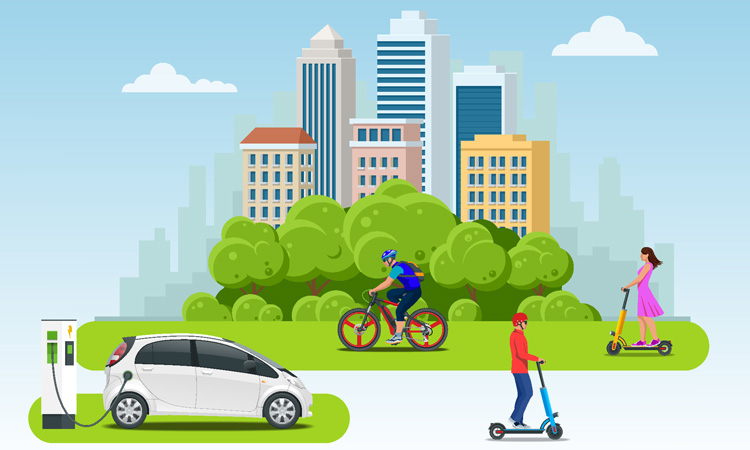Study explores potential sustainability scenarios for future mobility services
- Like
- Digg
- Del
- Tumblr
- VKontakte
- Buffer
- Love This
- Odnoklassniki
- Meneame
- Blogger
- Amazon
- Yahoo Mail
- Gmail
- AOL
- Newsvine
- HackerNews
- Evernote
- MySpace
- Mail.ru
- Viadeo
- Line
- Comments
- Yummly
- SMS
- Viber
- Telegram
- Subscribe
- Skype
- Facebook Messenger
- Kakao
- LiveJournal
- Yammer
- Edgar
- Fintel
- Mix
- Instapaper
- Copy Link
Posted: 19 February 2020 | Sam Mehmet (Intelligent Transport)
The study analysed how behaviour and regulation would affect mobility in two scenarios: ‘Cautious mobility change’ and ‘Extensive mobility change’.


A study, commissioned as part of the Mobility and Fuel strategy (MFS) of the German Federal Ministry of Transport and Digital Infrastructure (BMVI), has explored how mobility services such as e-scooters and car-sharing contribute to making transport more eco-friendly.
The study, which was managed by PTV Group, a German software company, examined how new mobility services will develop in interplay with conventional modes of transport in the future (by 2030 or 2050) and what impact this will have on transport and the environment. First, the scientists created an extensive market overview of current mobility offerings and the demand for these and analysed which various factors influence people to change their mobility behaviour.
Using these analyses, the researchers formulated two possible future scenarios. In Scenario A, the ‘Cautious mobility change,’ it was assumed that on-demand services will be legally facilitated, but that transport policy and behaviour will change only moderately in the coming years. In Scenario B, an ‘Extensive mobility change’ was assumed – that is, there will be a holistic, intermodal and thus long-lasting transport policy with targeted promotion of public transport, as well as bicycle and pedestrian traffic.
Since the conditions and demand structure differ sharply between urban and rural areas, they examined a total of four different areas: from urban areas to sparsely populated rural areas.
To validate future solutions, the research team simulated various scenarios with PTV software, with the aim to answer questions about ride hailing and on-demand service efficiency, mileage of transport services and changes in vehicle usage.
To compare the results, the MFS reference scenario was used, which includes all transport-related measures set in motion by the German federal government before 2017. Key findings include:
- In Scenario A, new mobility offerings accounted for five per cent of transport service in 2030, and in in Scenarios B the figure was 11 per cent
- By 2050, the share increases further – in Scenario A to approximately nine pe rcent and in Scenario B to nearly 17 per cent
- In Scenario B, the share of private vehicle usage in the urban environment continues to decrease, by nearly 14 per cent by 2030
- In Scenario A, the mileage; that is, the total number of kilometres travelled with all means of transport, increased by 1.2 per cent by 2030
- In Scenario B, the mileage decreased by eight per cent by 2030
- CO2 emissions decreased in both scenarios by 2030. In Scenario A by 1.8 per cent, in Scenario B by 13 per cent.
“Our evaluations clearly show that mobility concepts must be considered as a whole in order to achieve significant climate and environmental effects. New and enhanced mobility services initially create new options, which means that they increase the mobility of the population overall,” explained Rimbert Schürmann, Director of the study at PTV Transport Consult. “Despite the additional traffic this causes, new mobility offerings can contribute to reducing greenhouse gas emissions. The best effects occur if more than just the new mobility services are promoted. At the same time, conventional, non-motorised and public transport must be improved and linked to the new mobility offerings, and private vehicles must become less attractive.”
Related topics
Mobility Services, Multimodality, Public Transport, Sustainable Urban Transport
Related organisations
Federal Ministry of Transport and Digital Infrastructure, PTV Group
Related people
Rimbert Schürmann








